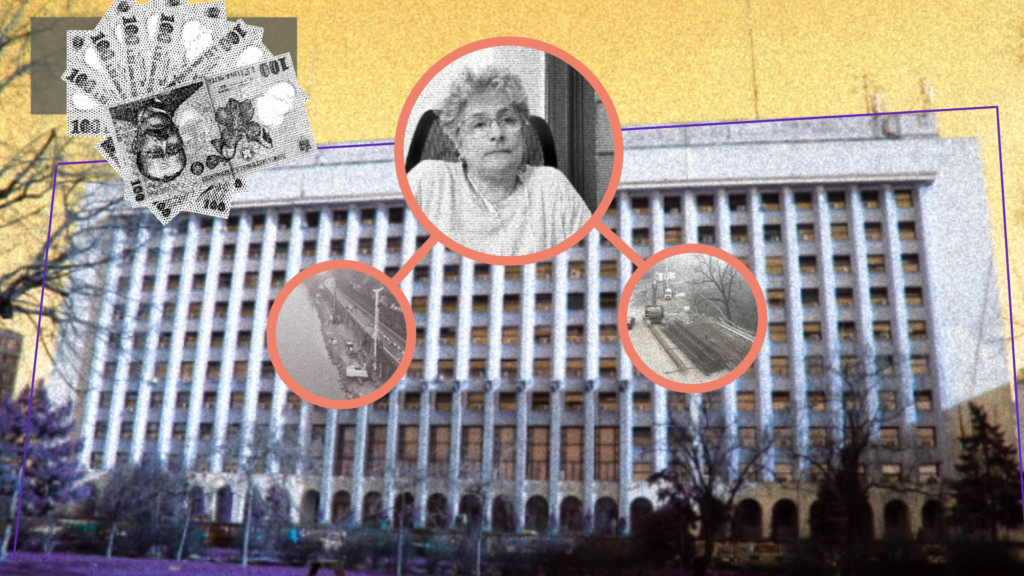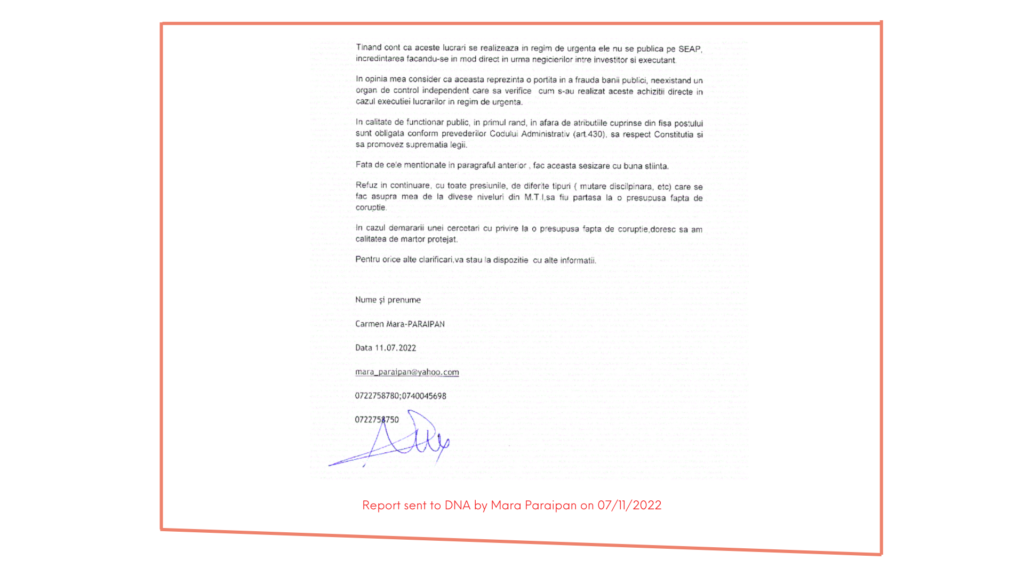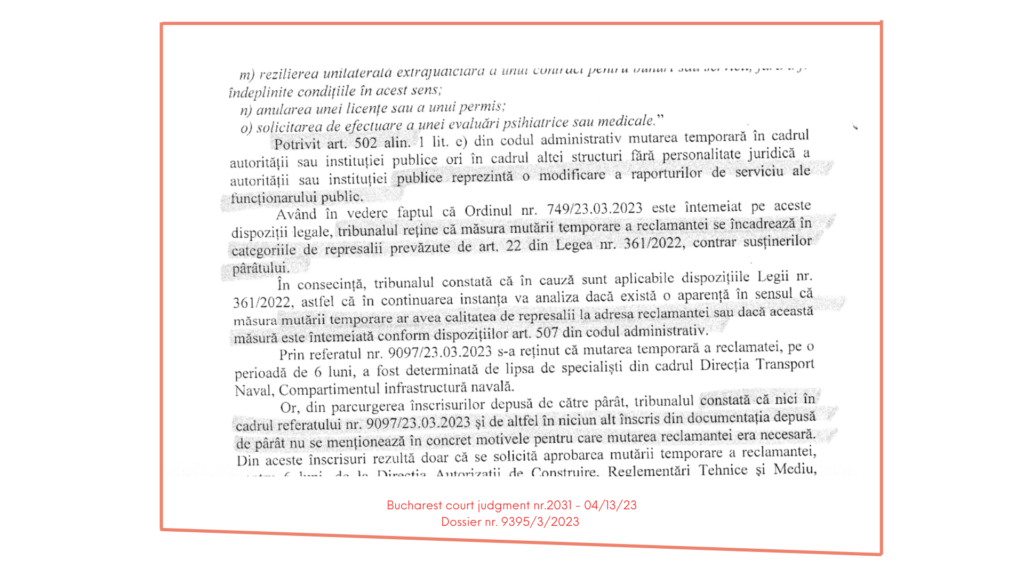This is the story of Mara Paraipan, a Romanian civil servant who blew the whistle on the Romanian Ministry of Transport *

Graphics: Raffaele Riccardo Buccolo
Seven months after she arrived at the ministry’s construction authorisation department in Bucharest, Paraipan had to approve a budget for an urgent construction project along the national road DN7. “The peculiarity of this type of authorisation is that there is no time for a real tender; we assign the work urgently and directly,” Paraipan said in an interview.
When the contract was registered in March 2020, the estimated value of the project was 1.3 million lei (260,000 euros). In June, when Paraipan began routine checks to close out the contract, she discovered the final value, signed by DRDP Craiova, the Regional Directorate of Roads and Bridges, was nearly 13 million lei – almost 10 times higher than the original amount. Furthermore, she discovered the entire sum already had been paid to the contractor, Alpha Construct SA, in October 2020.
The contract was managed directly by the DRDP of Craiova, which acts as an intermediary between the Ministry of Infrastructure and the company that carried out the work. The work consisted of reconstructing a retaining wall for a road section and the related surface for a length of 180 meters. It is also possible to watch a video summarising the work at this link.
In January 2021, Mara decided to send a formal letter to the directors of the Ministry of Transport and Infrastructure in order to delve into the reasons why the price of the project had risen so much. She reported that DNA also investigated DRDP Craiova for possible internal corruption cases. When Mara’s bosses at the Ministry receive the letter, they simply tell her to sign the final documentation without asking too many questions.
Although Mara pointed out the difference between the initial and final values several times, her office manager signed the documentation and asked Mara to archive the case. “I put pressure on my boss to ask DRDP for at least a justification for such an increase in the value of the works. Suddenly, the receipt arrived, and it did not explain the increase in value. In any case, my boss archived everything, asking me not to delve further,” Mara tells us.
Again: Five months later, another suspicious operation
Months later, a similar event happens, and it is once again Mara who notices something wrong with a contract.
In 2020 Mara authorised another emergency intervention for the DN 56 road. It is possible to watch a video of the project at this link.

The value authorised in 2020 by Mara Paraipan was 690,000 lei (139,000 euros). When she received the final documentation in mid-2022, Mara discovered that the liquidated value for this second contract was 4,276,381 lei (858,000 euros). When Mara noticed a growth of almost seven times the value agreed upon during the contract validation phase, she understood that a single case was transforming into a precise system. So, she decided to write to DNA, the National Anti-Corruption Directorate of Romania.
“The first time, despite formally opposing it, I continued to carry out my work – says Mara – but when I noticed the second transaction, I understood that the first case could have been something more structured, like a methodology”.
From employee to whistleblower: The trial
On 11 July 2022, Mara sent a letter to DNA Romania in which she recounted from the beginning the two cases, which, in her opinion, deserved further investigation as they could include dynamics of corruption. From that moment, Mara officially became a whistleblower and, as such, must be protected by European law 2019/1937, implemented in the Romanian legislative system in December 2022 (Law No. 361/2022).

In the following months, DNA requested all the documentation on the case from the Ministry of Transport.
2022 is ending while Mara waits to know the implications of her whistle. Meanwhile, the Ministry understood that the information came from her, as she first reported the two cases to her superiors before blowing the whistle to DNA.
In the spring of 2023, what Mara never expected happened: the Ministry of Transport sent her an urgent communication signed by Sorin Mihai Grindeanu, former Romanian Prime Minister, current Deputy Prime Minister, and President of the Ministry of Transport of Romania. The communication contains a temporary transfer order from the Department of Construction and Infrastructures to the Directorate of Shipping. In the communication, there are no particular reasons justifying the order other than a general reason of “transfer due to a vacant position”. «I felt angry and skeptical, it was crystal clear that it was a retaliation for my report to the DNA. It was incredible because the whistleblower law, just few months before approved, had not been considered».
The Article 22 of the new whistleblower protection law implemented in December 2022 in Romania is very clear about what happened to Mara Paraipan: it is a retaliation. The point “c” of the article reports that any modification to the employment contract or service relationship falls under retaliation.
The day after receiving the letter, Mara registered a request to appeal against the Romanian Ministry of Transport based on the transfer order received the day before. On April 13, the Bucharest court ruled the preliminary judgement on this case and temporarily blocked the transfer of Mara Paraipan, recognising that article 22 of law 361/2022 on the protection of whistleblowers had been violated, stating that the letter delivered to Mara Paraipan was retaliation against a whistleblower.
As Silviu Popa, Secretary General at The National Integrity Agency, also confirms to us, «Even if Mara Praipan presented the report using the old provisions (Law 571/2004), that law also provided for the prohibition of retaliation and privacy management of the complaint of the whistleblower, which is why what the court established seems correct”.
While the Ministry’s defence reports that the move was requested due to the lack of specialists in the naval department, the judge confirms that in the letter sent to Mara, there are no specified reasons for the move.
.

In the Court, the judge wrote: “Nowhere is the reason for the move concretely indicated, nor the direction in which it was moved; nor the concrete reasons why the appellant was chosen among the public employees to be moved”. On June 15, the Bucharest court ruled the final judgement. While recognising that this was a possible case of reprisal, found that Mara Paraipan had not made a preventive complaint within 30 days of the Ministry’s transfer request, which is why the request could not be accepted.
«My lawyer did not inform me that I should have made a preventive report within 30 days of receiving the transfer order. So I lost due to a simple procedure that I didn’t know needed to be done” Mara tells us. In June 2023, the Ministry of Transport once again ordered Mara to change the work section urgently, and so Mara was forced to move.
In August 2023, DNA informed Mara Paraipan that a proceeding for abuse of office had been opened for one of her reports.
For this case, we asked for a comment from the Romanian Ministry of Transport and Infrastructure. In an official letter sent us on 29 December 2023, they stated: “The orders relating to the modification of the service relationship by moving, for Ms Paraipan Carmen Mara, senior advisor at the Ministry of Transport and Infrastructure, Department of Construction Authorizations, Technical Regulations and Environment, were issued in accordance with the provisions laws in force”. However, we also asked for a comment from the company contracting the two works, Alpha Construct SA. We sent them 2 formal requests for comment in November 2023, but we received no response.
Even today, Romania has a public apparatus heavily penetrated by corruption. For 2022, Transparency International reported that 20% of national public service operators were at the centre of at least one corruption episode.
But as Silviu Popa tells us, the anti-corruption works have made great strides forward and the reality is more complex than a single number: «For instance, since January 2023, NIA received more than 500 complaints from various whistleblowers. Within the past 15 years, the Agency managed to build a solid track record of thousands of cases of incompatibilities, conflicts of interests, and unjustified assets of tens of millions of euros. Many of them resulted in dissuasive sanctions applied to members of the government, senior public officials, police officers, and local elected officials.)».
By the end of November ’23, Mara can return to her office at the public construction authorisation department. In fact, the transfer order was valid for only six months. Mara tells us that in Romania, the transfer of a public official without his will can only be agreed upon for six months every year (law 507/8). Mara thinks that it is still ongoing, and according to her, her department will try again to relocate her to other offices next January.
* This story was made with the help of Context.ro who first reported on Paraipan case and who kindly provided the author with the photo of Mara Paraipan.

